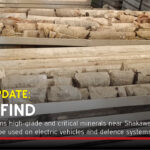Aims to de-risk mineral exploration in the country
Mineral exploration can often be a risky and costly undertaking, especially for junior miners when the exploration exercise hits a blank.
As a result of this, Botswana Geoscience Institute (BGI) has committed to make Botswana a preferred destination for mineral exploration by undertaking projects aimed at de-risking mineral exploration by ensuring availability and accessibility of geosciences information.
This was revealed by the institution’s Chief Executive Officer (CEO), Tiyapo Ngwisanyi during the unveiling of BGI’s new brand.
According to Ngwisanyi, these projects will enable BGI to offer effective advisory services on the mineral potential in the country.
“We will ensure safer communities and livelihoods by embarking on projects such as geotechnical investigations, seismicity monitoring, and assessment of geohazards on critical infrastructure,” said Ngwisanyi.
BGI will also promote public understanding of geoscience and demonstrate the importance of geoscience to resource and environmental issues, Ngwisanyi said.
He stated that BGI plays a key role in the development of the country, highlighting that construction material, safe and sustainable land for residential, industrial, and waste disposal, and the implementation of an increasingly complex infrastructure such as power and road networks depend on the baseline work of BGI.
“BGI, as like other Geoscience Organisations, plays a vital role in providing geoscience information and promoting mineral exploration and mining activity,” he said.
Ngwisanyi further noted that the growth in the level of exploration activity is evidenced by the expansion of the prospecting administration unit from one person in the ’80s to the current fully-fledged unit with more than six officers.
Meanwhile, the Minister of Mineral Resources, Green Technology, and Energy Security, Lefoko Moagi has noted that BGI is intricately linked to the country’s national development goals and strategic imperatives.
The government of Botswana has recently approved the implementation of the National Development Plan 11 (NDP11) project that assesses Mafic, Ultramafic and Granitic complexes in Botswana.
“It will highlight areas of high mineral potential such as Base metals, Rare Earth Metals, Precious metals, and Platinum Group Metals (PGMs) in these geologic environments including groundwater potential,” he stated.
The project is expected to be completed by February 2023 and will cost a whopping P10 million.
The minister indicated that even during economic hard times where some projects have been deferred, he said this one was given a priority due to its importance to the development of the country.
“This project will also result in a revised National Geological Map of Botswana, understanding of mineral systems as well as providing value-added products,” said Moagi.
The minister further said end products will go a long way in satisfying the requirements of investors in the exploration or mining sector, academia, and applied research as well as in the area of Agriculture and land use management.













